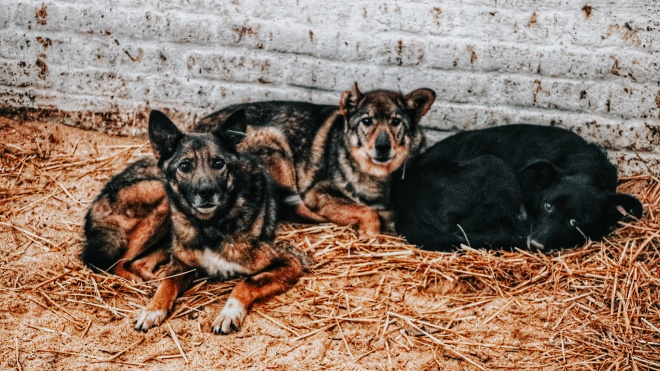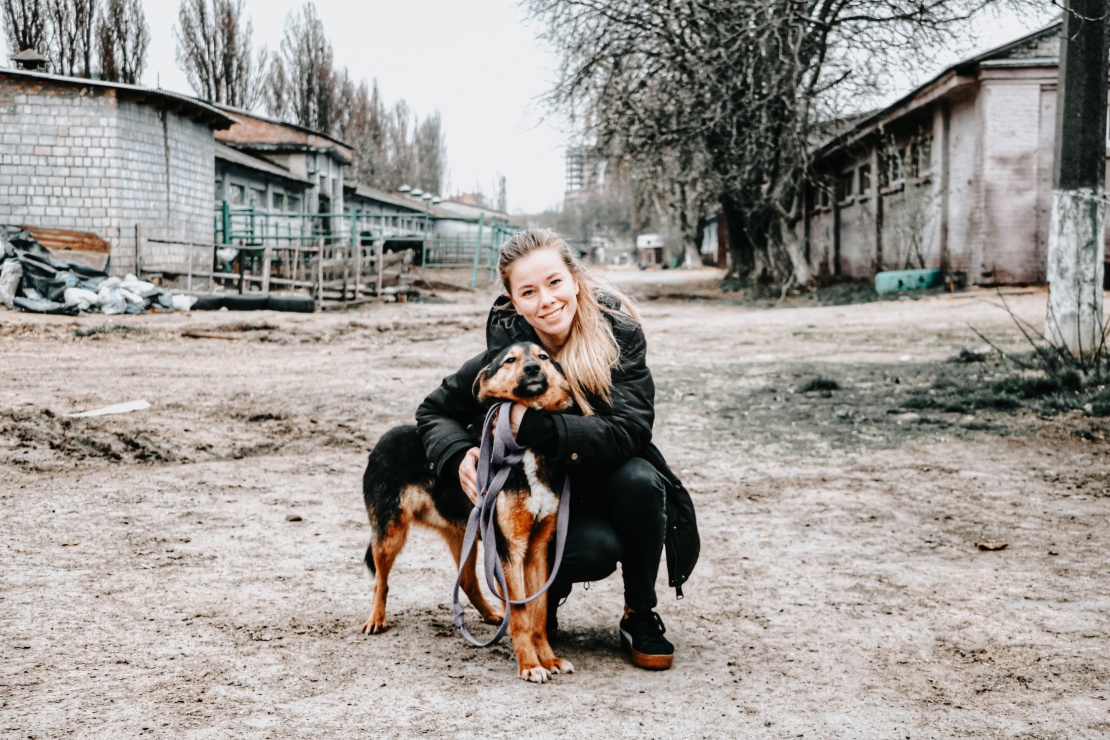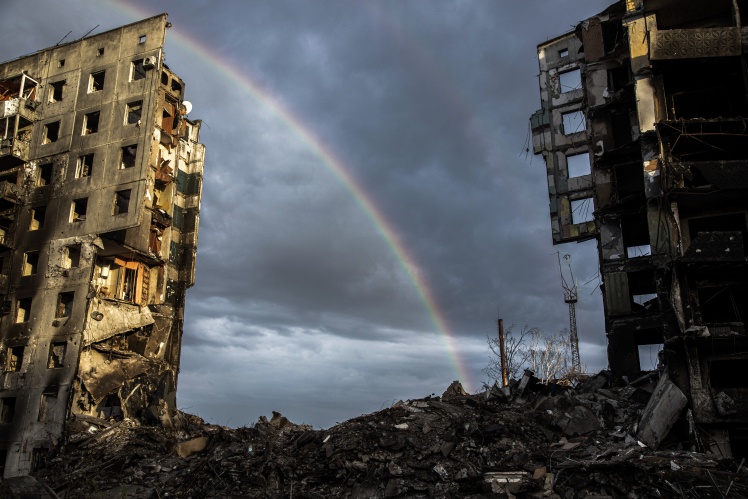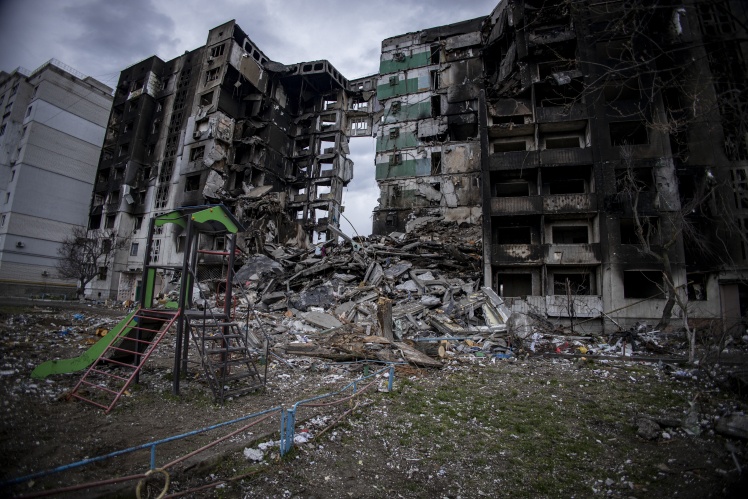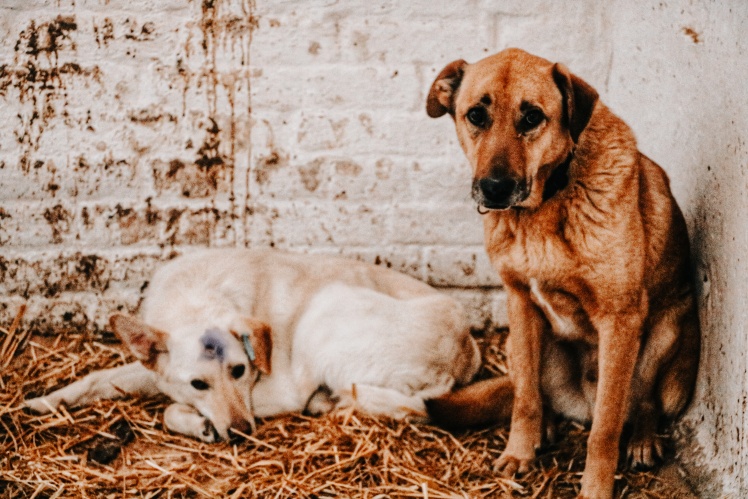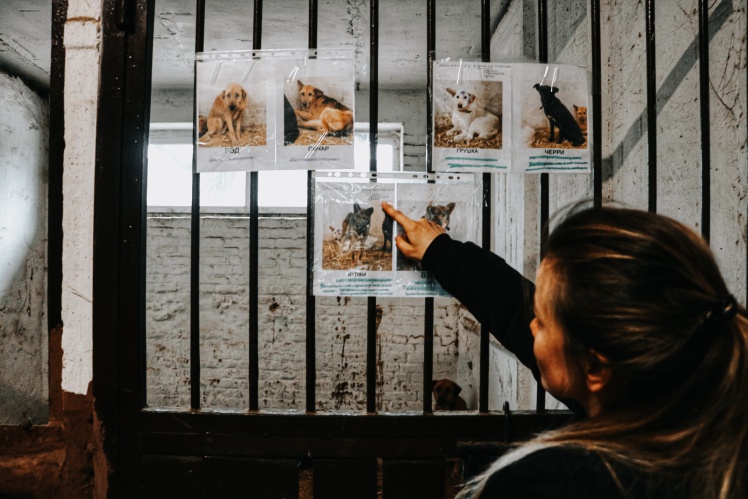In one of the stables of the Kyiv hippodrome there is a loud dog bark. Hundreds of dogs, which were rescued from the animal shelter in Borodyanka, share the space here together with horses. They have been living here for almost three weeks, since the Kyiv oblast was liberated from the occupiers.
I manage to get to the hippodrome at a time when animals usually go for a walk. The volunteers give me Lyonya, a local zinger. He is very friendly and, surprisingly, socialized. It seems that Lyonya is walking me, not the other way around: he confidently leads me forward on a leash, kindly greeting the local dogs with his nose and carefully marking the territory so that we donʼt get lost.
Meanwhile, Katya Levyk, co-founder of the Tailed BANDA Foundation, which now cares for animals rescued from an abandoned shelter, talks about how it all happened.
Katya Levyk and a rescued dog from Borodyanka.
Nadiya Sukha / «Babel'»
Prior to the full-scale war, Borodyanka had a municipal animal shelter. 485 dogs lived there — those left by their owners, found on the street or homeless. Volunteers came there once a week. The animals in the shelter had different stories, so some were more socialized, some less so. Therefore, some dogs lived in cages, others were lucky to walk on the street.
With the start of the full-scale war, says Kateryna, the volunteers tried to contact the shelterʼs management and offer their help. However, they could not get a clear answer about what happened to the animals and whether anyone cared for them.
“We do not know the exact date when the animals were left. The managers werenʼt telling lies, they just didnʼt tell the whole truth”, the volunteer says. “Video surveillance cameras used to work there. When the war broke out, they were turned off”.
Borodyanka after the Russian occupation
Getty Images / «Babel'»; Stas Kozlyuk / «Babel'»
After the liberation of Kyiv oblast it became known that zoo workers left the shelter and the animals were left without human help, according to animal rights activists. The dogs had no access to food, they were locked in the shelter, some — in their cages, Kateryna says.
“When Borodyanka was liberated, on the first day one of our volunteers went to the shelter and saw that the animals survived. This is a miracle, because no one has been there since the end of February. They didnʼt drink or eat”, Katya remembers.
The gates to the shelter were closed, so hardly any of the people could feed them. The animals sitting in the cages licked the condensate to get at least some water.
A volunteer tries to feed the rescued dog.
Nadiya Sukha / «Babel'»
Volunteers hoped that at least 30 of the 485 dogs would survive. But 263 animals managed to do this.
“On the first day, the ones in the most critical condition were taken away. The next day they found cars and people who could go. Unaccompanied, as there was still a curfew”, says Kateryna.
The animals were taken away, mostly in cages purchased in advance, because they wanted to evacuate the dogs back in March. Today, animals are in the hands of volunteers. It is still difficult for some to adapt to a normal life. At the hippodrome, they are under 24-hour supervision, have a well-established diet and walks.
Dogs rescued from a shelter. Kateryna shows a database of animals. here is information about the nature of the dog and its needs.
Nadiya Sukha / «Babel'»
There are also aggressive dogs. Leila is calm towards people, but impatient with animals. To get Leila out of the cage, volunteers have to cover all the other cages with animals.
Leila.
Nadiya Sukha / «Babel'»
Dogs still experience stress. However, they are already going for a walk: “One dog trembled on the ground to the day before yesterday. Today she has already left the cage and walked,” Katya explains.
Volunteer convinces the dog to go for a walk.
Nadiya Sukha / «Babel'»
“There are animals that have not yet come out, they are aggressive”, adds the volunteer. “But these are rare. The most aggressive became the most calm, as they were waiting for a man, waiting for help. Yesterday a dog took food and hid it in the ground with his nose. He made stocks for himself.
Some dogs are angry, but still waiting for people.
Nadiya Sukha / «Babel'»
Some animals find it difficult to cope with aggression or fear. They are professionally dealt with by cynologists. Others are helped by volunteers — they go to the cages, read fairy tales and show cartoons. This is how animals get used to the presence of people and to being safe around them.
A volunteer feeds dogs with her hands in a cage.
Nadiya Sukha / «Babel'»
Loki is a favorite of children, he gets along with them really well. They themselves ask to walk with him.
Loki with a little volunteer.
Nadiya Sukha / «Babel'»
Volunteer Anyaʼs three-legged dog also behaves more energetically than others — he jumps, runs and has fun. For the girl, this is the first experience of volunteering. She says she has wanted to take care of the animals for a long time. And when she heard about the rescued dogs from Borodyanka, she immediately decided to offer her help.
"I understand that someone will help a person, but many people forget about animals, and they need help as well. Thatʼs why now is the time to help them”, says Anya.
Volunteer walks with a dog.
Nadiya Sukha / «Babel'»
There are dozens of volunteers like her, helping animal rights activists every day. People show up and come to the hippodrome to feed, walk and socialize the animals.
Volunteers and dogs on a walk.
Nadiya Sukha / «Babel'»
Today, Danylo is responsible for Cappuccino, a dog the color of milk coffee. Seeing the camera, the dog poses. Local dogs make friends with the animals from the shelter and sometimes even borrow food from them.
"Since I have a broken collarbone, I do not need either the Armed Forces or the Territorial Defense, but I want to help at least somehow”, Danylo says. “I volunteered, gave a lot to the army and civilians: sleeping pads, baby food. Now I decided to help here. When they [the volunteers] had brought dogs that were suffering so much — you canʼt talk about it without tears”.
Danylo and Cappuccino.
Nadiya Sukha / «Babel'»
Katya Levyk is happy that the word has spread. He says that initially there were about 20 people in the Viber volunteer group, now there are more than 200. And the number of people willing to help is growing every day.
Julia and Toy.
Nadiya Sukha / «Babel'»
Many people come to the hippodrome to dedicate some free time to the animals. However, regular dog care is needed. Therefore, volunteers come here in two shifts: day and night. Some comfort was arranged for them — a volunteer can spend the night at the hippodrome and have lunch there.
During the night shift the volunteers sleep here.
Nadiya Sukha / «Babel'»
It is not yet clear for how long the hippodrome will be a home for dogs from Borodyanka. Some of the animals are still in veterinary clinics and need help. Another ones will take a long time to adapt. But some have already found a home. Both in Ukraine and abroad, in particular in Italy.
Support Babel: donate in hryvnia 🔸 in cryptocurrency 🔸 via PayPal
